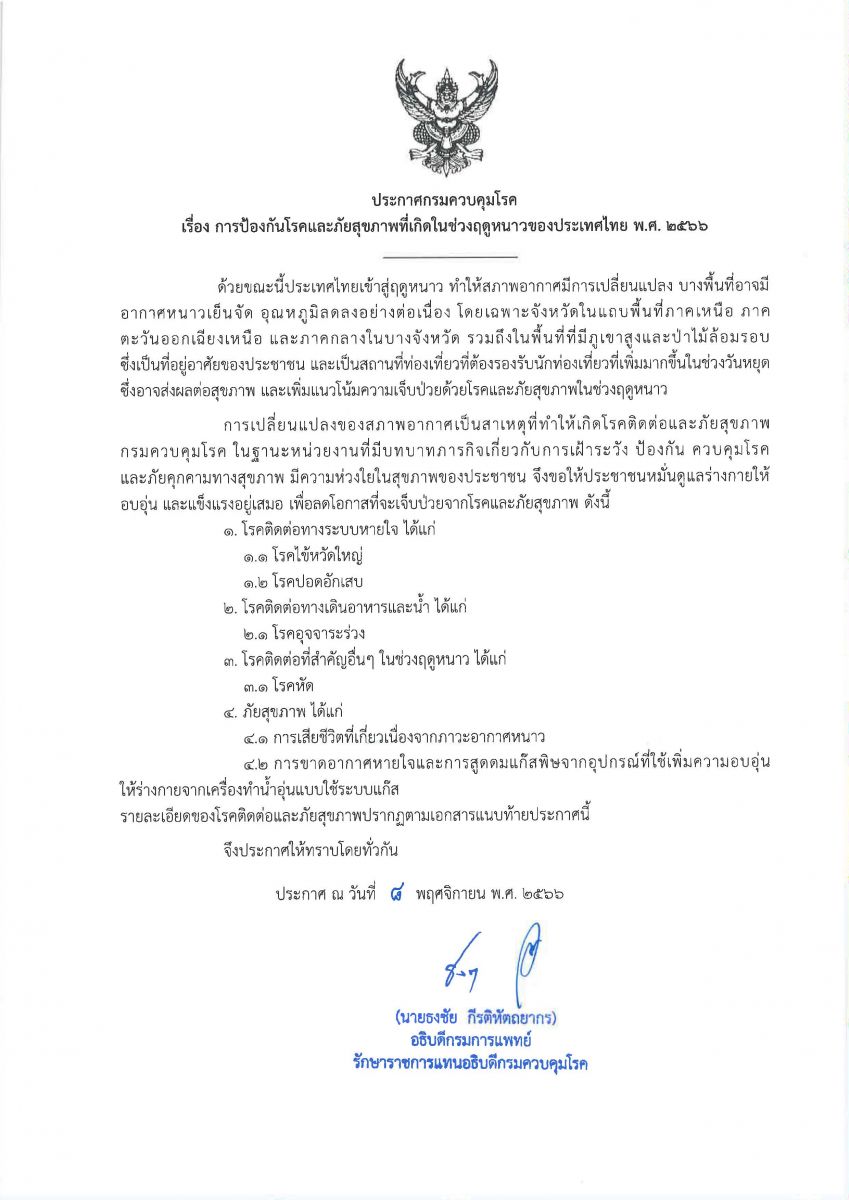Department of Disease Control, Ministry of Public Health is concerned about the health of the people and has issued a warning to people to keep warm. Stay healthy and stay healthy this winter. Focus on taking care of your health and protect yourself from 4 common infectious diseases and 2 important health threats. To reduce the chance of illness and death
Today (21 November 2023), Acting Director General of the Department of Disease Control Dr. Thongchai Keeradi Hattayakorn, Acting Director General of the Department of Disease Control, said that as the Meteorological Department announced that Thailand will enter winter from November 14, 2023, some areas will experience exceptionally cold weather. Climate change is a common cause of disease, especially in the northern provinces and the northeastern region. The Department of Disease Control has a surveillance mission. Disease Prevention and Control Therefore, warnings have been issued regarding disease prevention and health risks that may occur in winter in Thailand in 2023, which are divided into 4 groups as follows: 1. Respiratory system infectious diseases. (Cold Fever Pneumonia) 2. Gastrointestinal and Waterborne Diseases (Diarrhea) 3. Other Important Infectious Diseases in Winter (Measles) and 4. Health Hazards (Cold Weather Related Deaths and Inhalation of Toxic Gases from Gas Water Heaters) Details include:
Group 1 Infectious diseases of the respiratory system (colds) The virus is spread by breathing, coughing and sneezing. Patients often have a high fever, cough, runny nose, headache, muscle aches, fatigue, sore throat, runny nose and red eyes. Most patients recover on their own. But certain groups are at risk of complications and severe symptoms, such as people with chronic diseases. Young children or the elderly also have higher mortality rates in people over 60 years of age or those with chronic illnesses. (pneumonia) Caused by an infection of the air sacs in the lung tissue. Most pathogens are bacteria and viruses, such as influenza. Corona virus 2019, etc. Patients present with fever, cough and shortness of breath. People with severe symptoms may develop respiratory distress. And mortality is seen in all age groups. People with compromised immune systems and those with a history of chronic diseases such as diabetes and heart disease have more severe symptoms. It can be treated with antibiotics based on the bacteria that cause the disease. In addition, there is the disease COVID-19, which must be monitored. Once infected, patients experience symptoms for an average of 5 days. Common symptoms include fever, chills, sore throat, muscle aches, headache, and loss or change in the sense of taste or smell. If you have any suspicious symptoms, get tested for ATK infection immediately, and if the results are positive, always wear a mask. Avoid doing activities with others. If symptoms are severe, seek hospital treatment. And asking people to get the Covid-19 vaccine. If infected, it can prevent serious illness and death.
Group 2: Gastrointestinal and waterborne diseases (viral diarrhea) Caused by ingestion of food or water/ice contaminated with pathogens. Especially viruses that cause gastrointestinal diseases. Eating uncooked or old food, unclean utensils It can be diagnosed in patients of all genders and ages. The patient has loose or watery diarrhea. Most will heal on their own. But if too much water and minerals are lost, it can cause shock, loss of consciousness, and death. It can be prevented by observing good hygiene. Drink clean water and eat clean, cooked food.
Group 3 Other Important Infectious Diseases in Winter (Measles) Communicate by coughing, sneezing or talking at close range. Patients can spread the infection 1-2 days before symptoms start. They usually have a fever, runny nose, dry cough and a rash that looks like a red rash. There is no specific treatment for patches that stick together. But there is a vaccine to prevent the disease. The first dose is given at 9-12 months of age and the second dose at one and a half years.
Group 4: Cold weather-related health hazards causing death. Death occurs inside and outside the dwelling without adequate clothing or winter protection. Tell people to be ready to warm up. Eat nutritious food and drink warm drinks. Wear adequate winter clothing. Avoid drinking any kind of alcoholic beverages. Alcohol consumption is a factor that increases the risk of death in cold weather.
Additionally, letBe careful of inhaling toxic gases from gas water heaters. This is because gas water heaters have incomplete fuel combustion. Additionally, there are not enough ventilation holes in the bathroom. Carbon dioxide causes gas accumulation. And high levels of carbon monoxide can cause sudden death in those who breathe it. Tourists should pay attention to the ventilation in the bathroom. If using a gas water heater, turn on the ventilation fan after each shower. In case of bathing with several people, turn on the exhaust fan and leave the bathroom door open for at least 10 minutes. If there is no exhaust fan, leave the bathroom door open for at least 15 minutes to allow air to circulate. And make time for a quick shower.
Dr Thongchai added that in winter, people like to travel to enjoy the cold weather. Therefore, we seek cooperation from tourism related agencies. Facilitate, counsel, observe and prevent accidents to tourists at points or areas of repeated danger. And advise tourists with congenital diseases such as heart disease and high blood pressure and take extra care to prevent unexpected cases of respiratory disease. Take your medicine with you every time you travel. And for the safety of motorists and other road users, motorists should not drink alcohol or consume drugs. For more information, call the Department of Disease Control’s hotline at 1422.
**********************************
Information: Division of Epidemiology/Office of Risk Communication, Department of Disease Control
November 21, 2023

“Avid gamer. Social media geek. Proud troublemaker. Thinker. Travel fan. Problem solver.”


.jpg)